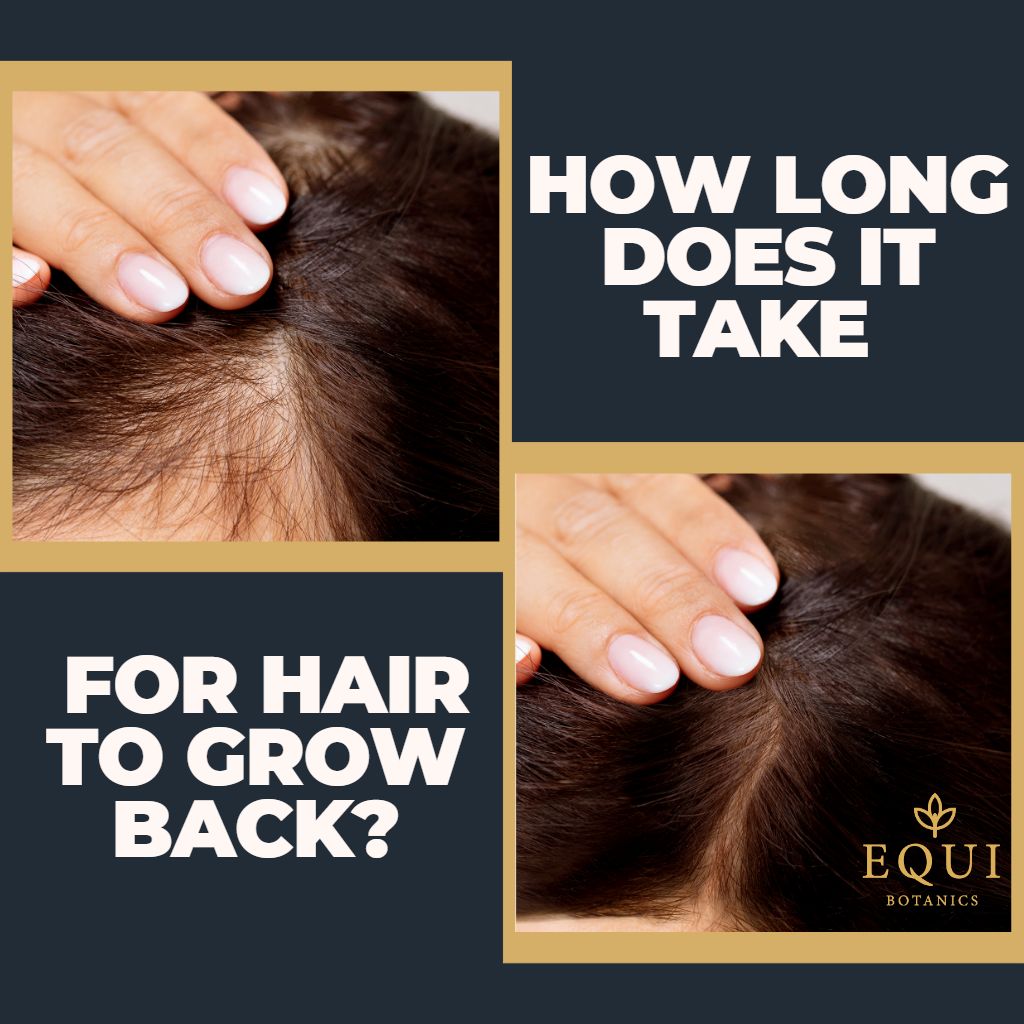
Hair plays a big part in a person’s visual identity and, as such, it can be traumatic for anyone suffering from hair loss.
Hair fall can affect confidence, but the good news is in most cases, it is reversible although it is important to remain realistic and realise that it is not an overnight recovery. Some progress in hair growth can be seen in as little as a few weeks but it is usually several months before substantial results are seen.
There is no doubt regrowth requires patience and a consistent routine but we’re here to talk you through how long it takes for hair to grow back, so keep reading!
Average regrowth times: A Summary

Stages of Hair Growth
Hair growth starts at the follicles, which is an opening on the surface of the scalp for the hair to grow through. On average, there are around 100,000 follicles on the scalp.
Hair growth is a cycle of four stages which are as follows:
Anagen- the active growth phase which lasts between 2 and 8 years before follicles become dormant.
Catagen- a transitional phase that occurs when hair stops growing. This lasts around 4-6 weeks.
Telogen- this is the resting phase when hair doesn’t grow or fall out, lasting around 2-3 months.
Exogen - this is the shedding phase where hair falls out, it tends to last around 2-5 months.

In a normal scalp that is not suffering hair loss, between 90-95% of the follicles will be in the anagen, or growing phase, with most of the remaining 5-10% in the telogen phase. There will also be a small number of follicles in the catagen phase.
The exogen phase, which some consider part of the telogen phase, is when hair sheds from the scalp and it is normal to lose anywhere between 50-100 strands a day.
How long does it take hair to grow back?
The rate of hair growth is not an exact science as it will vary depending on circumstances, including ethnicity, age, lifestyle, and even gender.
Male hair, for example, will grow faster than female locks. As we get older, particularly after the age of 30, hair growth tends to slow down with strands becoming smaller which is why mature hair thins.
Ethnicity can also play a major part in the speed of hair growth. Studies have shown that, on average, Asian hair grows the fastest at around 0.49 inches per month, Caucasian hair grows around 0.44 inches per month, and black hair grows around 0.33 inches per month
For those wondering how long it takes hair to grow back after a haircut, if you were to cut shoulder length hair to a cropped bob, it could take two to three years before it was back to the original length. If you want to know how long hair will grow in six months, on average it would be around three inches.
How long does hair take to grow back after hair loss?
Once again, hair regrowth rates will vary based on the reason for your hair loss and the type of hair fall you are experiencing. Hair regrowth after loss can also grow back a different texture, or even colour, to what it was previously. Causes of hair loss and regrowth rates include:
1. Alopecia Areata
An autoimmune condition, sufferers of alopecia areata see their immune systems attack the hair follicles causing hair to fall out in patches. Typically, it affects the scalp, but it can also cause hair on other parts of the body to fall out including the eyebrows, lashes, and legs.
This form of alopecia is unpredictable in nature, in that hair can begin to regrow and then fall out again. When hair does grow back, the overall process can last months with a full recovery within a year, but most sufferers will experience more than one episode during their lifetime.
2. Stress
When a person is under stress, it can cause a hair loss known as telogen effluvium. Stressful situations that induce this type of hair fall include illness, a death in the family, childbirth, and surgery.
Generally, this hair loss will start around two months after the initial event that triggers stress and can last up to six months. Telogen effluvium tends to be an all over thinning of hair, rather than patches like alopecia areata, that take about three to six months to regrow.
One way to help relieve stress is to perform a daily scalp massage which can also encourage blood flow to promote regrowth. Use a hair treatment, such as the Black Seed Hair Oil Elixir, which is designed to support hair and scalp health as well stimulate hair growth.
Black Seed Hair Oil Elixir
This Black Seed Oil For Hair is enriched with Fenugreek, Brahmi and Bhringaraj ayurvedic oils, our first hair serum is your best bet to reaching your hair goals. Stop split ends, check. Stop itchy scalp, check. Help accelerate growth, check check check. We've jam-packed this little bottle with luxurious ingredients from the Caribbean, India and the Amazonian rainforest to give you longer, thicker, and stronger hair in less time.
3. Hormonal imbalances
Hormonal changes, caused by childbirth, the menopause, thyroid problems, or even a hysterectomy, can impact on hair and induce hair loss. When oestrogen and progesterone levels drop, hair growth slows, and hair can thin out.
Although it is often not permanent, it can be difficult to determine how long hair will fall out for, but once regrowth starts, you will notice a difference in around three to six months.
4. Nutritional deficiencies
A lack of certain vitamins and nutrients can spark an episode of hair loss. Vitamin B12 as well as iron, biotin, folate, and zinc have all been associated with hair loss but increasing your intake with the foods you consume, or by taking a supplement, can rectify the issue. Once the deficiency is eliminated, it will take around two to three months to grow.
5. Scalp conditions
Certain scalp conditions, such as psoriasis, can cause hair loss particularly if the scalp is inflamed, or you are frequently itching the area as this can loosen the follicle.
Although there are steroid treatments that can be prescribed to help this ailment, try treating the scalp with a naturally derived hair mask, such as the Babassu Oil Treatment Hair Masque, which soothes the scalp, reduces inflammation, and induces hair growth. Once the psoriasis is healed, regrowth will begin within a few weeks.
Babassu Oil Treatment Hair Masque
The Babassu Deep Treatment Hair Masque is an intensive protein-moisture balanced treatment that applies a restorative formula to the hair, using steam to encourage absorption into the hair shaft. It is jam-packed with Brazilian butter, Tucuma and Murumuru seed butters and revitalising oils to nourish your hair. It’s so rich and gets to work for longer, you only need to apply it once or twice a month.
In between washes, when you feel like your scalp could do with a moisture boost, spritz the Rice Water and Green Tea Hair Tonic all over the hair and scalp, this gentle formulation can be used daily.
Rice Water and Green Tea hair tonic and detangler
The Rice Water and Green Tea Hair tonic is jam-packed with natural, detangling and hydrating botanicals for refreshing hair daily. It is very effective on gym days when the hair is dried out from sweat so you can feel confident after a workout. The Rice Water and Green Tea hair tonic is also effective when used for detangling hair on wash days to save hours before applying the cleanser.
6. Androgenetic Alopecia
More commonly known as pattern hair loss, androgenetic alopecia can occur in both men and women. Although it is typically a permanent hair loss, in its early stages, hair fall can be slowed or even stopped. Using a treatment, such as Minoxidil, works to stimulate hair follicles in the resting phase into the growth phase, keeping them within that phase for a longer period. Results with minoxidil can see recovery from telogen effluvium in as little as 8 weeks.
7. Chemotherapy
One side effect of chemo treatment is hair loss, but once the treatment is complete, it does not take long for hair to begin to regrow. In fact, hair can start to grow in as little as 2-3 weeks. Generally, the hair growth signs in the first month will be a soft fuzz but after that, on average, locks can grow at a rate of 6 inches per year. If you have had a long period of strong chemotherapy treatment, there is a chance that your hair won’t regrow.
Final Thoughts
Although growth rates vary depending on hair loss causes, when it comes to how quickly hair grows back, you usually should see progress within a few months. It is important to identify the cause before you try to treat hair loss as you may require medical treatment before your hair can recover. Remember, you can’t speed up hair regrowth. This is a journey that requires patience and a consistent routine to restore locks to their former glory.


